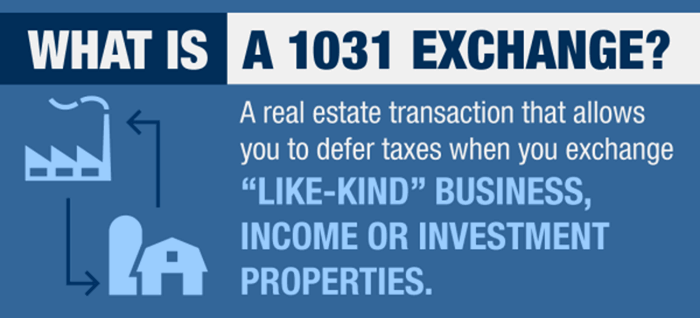Texas Coast Businesses can defer taxes using 1031 Exchanges
Section 1031 is a provision of the Internal Revenue Code (IRC) that allows a business or the owners of investment property to defer federal taxes on some exchanges of real estate.
The provision is used by investors who are selling one property and reinvesting the proceeds in one or more other properties. It is not available to buyers or sellers of personal homes for their own use.
How Savvy Investors Use 1031s to Defer Capital Gains and Build Wealth
- A 1031 exchange is a tax break. You can sell a property held for business or investment purposes and swap it for a new one that you purchase for the same purpose, allowing you to defer capital gains tax on the sale.
- Proceeds from the sale must be held in escrow by a third party, then used to buy the new property; you cannot receive them, even temporarily.
- The properties being exchanged must be considered like-kind in the eyes of the IRS for capital gains taxes to be deferred.
- If used correctly, there is no limit on how frequently you can do 1031 exchanges.
- The rules can apply to a former principal residence under specific conditions.
1031s for Vacation Homes
You might have heard tales of taxpayers who used the 1031 provision to swap one vacation home for another, even for a house where they want to retire, and Section 1031 delayed any recognition of gain. Later, they moved into the new property, made it their principal residence, and eventually planned to use the $500,000 capital gain exclusion. This allows you to sell your principal residence and, combined with your spouse, shield $500,000 in capital gain, if you’ve lived there for two years out of the past five. In 2004, Congress tightened that loophole.
However, taxpayers can still turn vacation homes into rental properties and do 1031 exchanges. For example, you stop using your beach house, rent it out for six months or a year, and then exchange it for another property. If you get a tenant and conduct yourself in a businesslike way, then you’ve converted the house to an investment property, which should make your 1031 exchange all right. Per the IRS, offering the vacation property for rent without having tenants would disqualify the property for a 1031 exchange.
1031 exchanges apply to real property held for investment purposes. Therefore, a regular vacation home won’t qualify for 1031 treatment unless it is rented out and generates an income.
Reference


